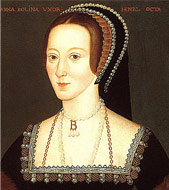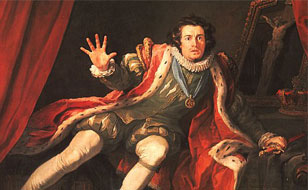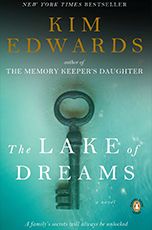 Historian Alison Weir builds a case for Anne Boleyn’s innocence in the charges of adultery and treason that lead to her death sentence, in her new book The Lady in the Tower: The Fall of Anne Boleyn (Ballantine, 464pgs). Boleyn has remained a striking historical figure through the centuries, and volumes have been written about her life and marriage to King Henry VIII. “She’s the Other Woman in an eternal triangle,” states Weir in an interview with NPR, “and Katherine of Aragon is the Good Wife whom Henry dumps for her.” In this latest book, Weir conducts “a forensic investigation” of the queen’s downfall and focuses on the last four months of her tragic life.
Historian Alison Weir builds a case for Anne Boleyn’s innocence in the charges of adultery and treason that lead to her death sentence, in her new book The Lady in the Tower: The Fall of Anne Boleyn (Ballantine, 464pgs). Boleyn has remained a striking historical figure through the centuries, and volumes have been written about her life and marriage to King Henry VIII. “She’s the Other Woman in an eternal triangle,” states Weir in an interview with NPR, “and Katherine of Aragon is the Good Wife whom Henry dumps for her.” In this latest book, Weir conducts “a forensic investigation” of the queen’s downfall and focuses on the last four months of her tragic life.
Read more…

Categories: Biography, New Release, News, Non-Fiction Tags: Alison Weir, Anne Boleyn, Henry VIII, Hilary Mantel, The Lady in the Tower: The Fall of Anne Boleyn, Thomas Cromwell, Tudors, Wolf Hall

David Garrick as Richard III (detail) by William Hogarth
Did history and literature give Richard III a bad rap? Shakespeare immortalized the English king as a Machiavellian tyrant, and history has branded him as a hunched-backed villain, rumored to have murdered two princes in order to secure his ascension to the thrown. But according to author Philippa Gregory, Richard III may have just been misunderstood. In a recent interview with the LA Times, she discusses her new historical novel The White Queen (Touchstone, 432pgs), and her surprising take on this controversial figure. “It’s an act of historical recovery,” she says, “…history, of course, gets told by the victors. That’s what Shakespeare tapped into in his play about Richard — that and a medieval belief that a malformed mind led to a malformed body.” Gregory argues that there is historical evidence that supports a case for Richard’s innocence and for the guilt of the Tudor family, who eventually took Richard’s life and his thrown during the Battle of Bosworth Field in 1485.
Read more…

 Historian Alison Weir builds a case for Anne Boleyn’s innocence in the charges of adultery and treason that lead to her death sentence, in her new book The Lady in the Tower: The Fall of Anne Boleyn (Ballantine, 464pgs). Boleyn has remained a striking historical figure through the centuries, and volumes have been written about her life and marriage to King Henry VIII. “She’s the Other Woman in an eternal triangle,” states Weir in an interview with NPR, “and Katherine of Aragon is the Good Wife whom Henry dumps for her.” In this latest book, Weir conducts “a forensic investigation” of the queen’s downfall and focuses on the last four months of her tragic life.
Historian Alison Weir builds a case for Anne Boleyn’s innocence in the charges of adultery and treason that lead to her death sentence, in her new book The Lady in the Tower: The Fall of Anne Boleyn (Ballantine, 464pgs). Boleyn has remained a striking historical figure through the centuries, and volumes have been written about her life and marriage to King Henry VIII. “She’s the Other Woman in an eternal triangle,” states Weir in an interview with NPR, “and Katherine of Aragon is the Good Wife whom Henry dumps for her.” In this latest book, Weir conducts “a forensic investigation” of the queen’s downfall and focuses on the last four months of her tragic life.

